Related Research Articles

The ZX Spectrum is an 8-bit home computer developed and marketed by Sinclair Research. Considered one of the most influential computers ever made, it is also one of the best-selling British computers ever, with over five million units sold. It was released in the United Kingdom on 23 April 1982, and around the world in the following years, most notably in Europe, the United States, and Eastern Bloc countries.

The Quill is a game creation system for text adventures. Written by Graeme Yeandle, it was published on the ZX Spectrum by Gilsoft in December 1983. Although available to the general public, it was used by several games companies to create best-selling titles; over 450 commercially published titles for the ZX Spectrum were written using The Quill.

Sabre Wulf is an action-adventure game released by British video game developer Ultimate Play the Game for the ZX Spectrum home computer in 1984. The player navigates the pith-helmeted Sabreman through a 2D jungle maze while collecting amulet pieces to bypass the guardian at its exit. The player does not receive explicit guidance on how to play and is left to decipher the game's objectives through trial and error. Sabreman moves between the maze's 256 connected screens by touching the border where one screen ends and another begins. Each screen is filled with colourful flora, enemies that spawn at random, and occasional collectibles.

Telecomsoft was a British video game publisher and a division of British Telecom. The company was founded by Ederyn Williams in 1984 and operated three separate labels: Firebird, Rainbird, and Silverbird. The first employee was James Leavey, seconded from elsewhere in BT, who, along with Tony Rainbird, became the driving force behind the company in the early days.

Laser Squad is a turn-based tactics video game, originally released for the ZX Spectrum and later for the Commodore 64, Amstrad CPC, MSX, Amiga, Sharp MZ-800 and Atari ST and PC computers between 1988 and 1992. It was designed by Julian Gollop and his team at Target Games and published by Blade Software, expanding on the ideas applied in their earlier Rebelstar series. Laser Squad originally came with five mission scenarios, with an expansion pack released for the 8-bit versions, containing a further two scenarios.
Julian Gollop is a British video game designer and producer specialising in strategy games, who has founded and led Mythos Games, Codo Technologies and Snapshot Games. He is known best as the "man who gave birth to the X-COM franchise."
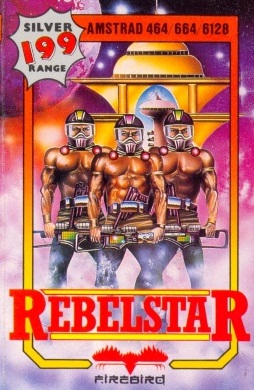
The Rebelstar games are a series of turn-based tactics video games designed by Julian Gollop. Rebelstar Raiders was published in 1984 by Red Shift for the ZX Spectrum. It was reworked in machine code as Rebelstar, published by Firebird in 1986. A sequel, Rebelstar II, was published in 1988 by Silverbird. Rebelstar, but not its sequel, was also adapted for the Amstrad CPC home computer.
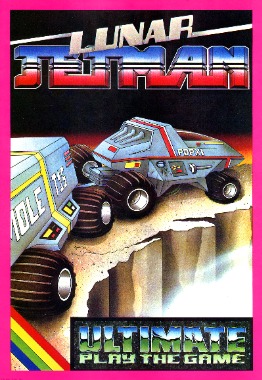
Lunar Jetman is a horizontally scrolling shooter developed and published by Ultimate Play the Game. It was released for the ZX Spectrum in 1983 and later on the BBC Micro. In this sequel to Jetpac, the second instalment of the Jetman series, Jetman has to destroy alien bases whilst simultaneously defending himself, along with Earth, from a hostile alien race.
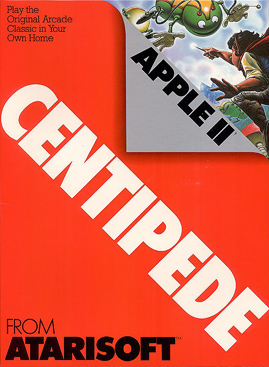
Atarisoft was a brand name used by Atari, Inc. in 1983 and 1984 to publish video games for non-Atari home computers and consoles. Each platform had a specific color for its game packages: video games sold for the Commodore 64 were in green boxes, games for the TI-99/4A in yellow, the IBM PC in blue, and so on.

Artic Computing was a software development company based in Brandesburton, England from 1980 to 1986. The company's first games were for the Sinclair ZX81 home computer, but they expanded and were also responsible for various ZX Spectrum, Commodore 64, BBC Micro, Acorn Electron and Amstrad CPC computer games. The company was set up by Richard Turner and Chris Thornton. Charles Cecil, who later founded Revolution Software, joined the company shortly after it was founded, writing Adventures B through D. Developer Jon Ritman produced a number of ZX81 and Spectrum games for Artic before moving to Ocean Software.

Match Day is a football computer game, published by Ocean Software in 1984 for the ZX Spectrum. It is the first game in the Match Day series, and was the creation of programmer Jon Ritman and Chris Clarke. Versions were later released for the Amstrad CPC and PCW, BBC Micro, Commodore 64 and MSX systems.
Quicksilva was a British games software publisher active during the early 1980s.
Crystal Computing, later renamed Design Design, was a British video game developer founded in 1982 by Chris Clarke and Ian Stamp while students at the University of Manchester. Graham Stafford, Neil Mottershead, Simon Brattel and Martin Horsley, joined the company as it expanded. The company's first software release was a compilation of games for the Sinclair ZX81, though it was with the ZX Spectrum that Crystal found its greatest success. A deal with the machine's manufacturer Sinclair to distribute Crystal's Zeus Assembler gave the company sufficient funds for a major marketing campaign for their next product, Halls of the Things, an arcade adventure game that became their most successful title.
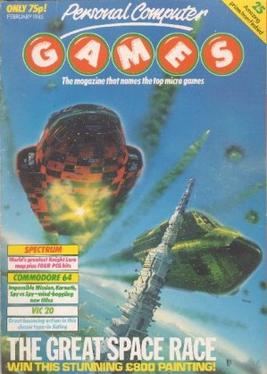
Personal Computer Games was a multi-format UK computer games magazine of the early/mid-1980s published by VNU.
DK'Tronics Ltd was a British software and hardware company active during the 1980s. It primarily made peripherals for the ZX Spectrum and Amstrad CPC but also released video games for the ZX81, ZX Spectrum, Commodore 64, VIC-20, BBC Micro, Memotech MTX, MSX and Amstrad platforms.
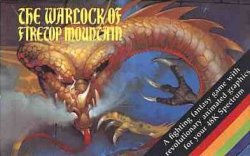
The Warlock of Firetop Mountain is an action game published by Crystal Computing in 1984 for the ZX Spectrum home computer. It is loosely based on the adventure gamebook of the same name written by Steve Jackson and Ian Livingstone, and published by Puffin Books in 1982.
MC Lothlorien was a video games developer and publisher based in United Kingdom. The company was founded in 1982 and initially specialised in developing software for the ZX Spectrum, Dragon 32 and BBC Micro computer platforms on its own Lothlorien publishing label.

Apocalypse: The Game of Nuclear Devastation is a video game based on the board game Apocalypse: The Game of Nuclear Devastation by Games Workshop.

Battlecars is a vehicular combat game released for the ZX Spectrum in 1984. It is based on Games Workshop's miniature wargame, Battlecars. The game is set in 2084 in a future where road accidents have been eliminated by technology, and the world is relatively bloodless; however, people now entertain themselves by drivers using 20th century automobiles in violent, gladiatorial contests.
References
- ↑ Red Shift advertising from Personal Computer Games, issue 3, page 104
- 1 2 "From Tin Soldiers to Computer Games"; CRASH issue 9, October 1984; retrieved from CRASH The Online Edition
- ↑ "Julian Gollop Biography". Chaos Squad. Archived from the original on 2012-07-22. Retrieved 2007-08-19.
- ↑ "Games that changed the World: X-Com". computerandvideogames.com. Retrieved 2007-08-19.
- ↑ News, The 14th ZX Microfair from CRASH issue 12, Christmas Special 1984/85; retrieved from CRASH The Online Edition
- ↑ Red Shift at World of Spectrum
- ↑ Red Shift at the Complete BBC Micro Games Archive
- ↑ First Empire at SpectrumComputing.co.uk
- ↑ City of Death at SpectrumComputing.co.uk
- ↑ The Tripods at SpectrumComputing.co.uk